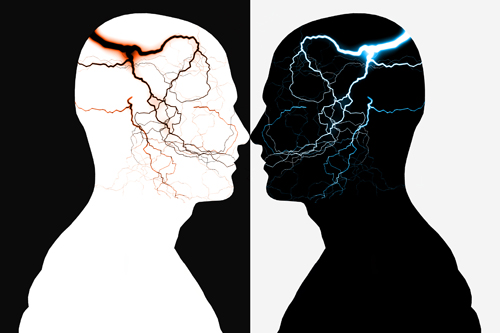 It’s 5:20 on a Monday evening. I took a vacation day, and I’ve been sitting in a coffee shop in Logan Square since morning, frantically cramming for the neurobiology portion of my Anatomy and Physiology final.
It’s 5:20 on a Monday evening. I took a vacation day, and I’ve been sitting in a coffee shop in Logan Square since morning, frantically cramming for the neurobiology portion of my Anatomy and Physiology final.
I’m woefully underprepared, and I know it.
I can’t stand being underprepared for anything, but I haven’t been able to focus on studying. I’m trying to flip through the digital flash cards that accompany my textbook, but the structures and terms don’t stay with me. The distinctions between Wernicke’s area and the somatic sensory association cortex of the brain blend into the background of tattooed people swilling lattes. I’m not paying attention; I haven’t been paying attention all day.
When I look at the clock, I realize I’ve spent an entire vacation day ruminating on a argument with Mom and Dad. I am about to destroy my grade in a class I’ve fought to master.
I’m dwelling on the argument I had with my parents. I can’t believe what they said; I can’t believe what I said. I really wish things hadn’t gone the way they did. When I look at the clock, I realize I’ve spent an entire vacation day ruminating on an argument with Mom and Dad. I am about to destroy my grade in a class I’ve fought to master.
I don’t have time for this. I need to stop thinking about my feelings and focus. I need to write my main-concepts summary and be ready for this test.
First section to summarize is Neurotransmitters. Serotonin: produced in the gut. Serotonin helps relieve pain, is also found in some plants, and is stimulated by social interactions. It mainly impacts memory, sleep, cognition, and mood. Deficit in serotonin can cause depression or worse. Serotonin dysfunction can be seen in babies who are left alone in orphanages or in elderly people lacking affectionate contact. A lack of proper serotonin uptake can literally destroy your will to live, creating a condition known as failure to thrive, and a relationship gone wrong can tip the balance to ruin serotonin uptake.
Now is not the time to think about that fight again! I don’t have time to obsess over my own serotonin levels, so I focus on cranial nerves instead.
The trigeminal nerve has three main branches. Branch 3, the mandibular nerve, passes through the little holes on the front of your jawbone. It moves and feels, unlike the other two branches of the trigeminal nerve (which only have sensation). Smiling stimulates the trigeminal nerve, encourages serotonin release.
I’m frowning at the screen, I realize. I try to smile. Being angry isn’t going to help me stimulate serotonin to remember any of these terms.
The more I focus on this fight, the more I’m proving my textbook’s thesis that my brain is only as functional as the relationships it maintains.
I wonder if my prefrontal cortex fires the way it should.
I pause. I look back at my notes thus far.
It’s now 9:20 p.m.
All of these structures and chemicals of higher cognitive function centralize around their design to improve or destroy one’s relationships. Tomorrow, I’m responsible for explaining all the structures and functions that allow my brain and nervous system to work, but all I really know and understand is the argument I keep mentally rehashing. The only thing my mind wants to comprehend is the relationship breakdown between my parents and me.
But this is the perfect example of everything I’m trying to learn.
The more I focus on this fight, the more I’m proving my textbook’s thesis that my brain is only as functional as the relationships it maintains.
I click my laptop shut and put away my notes. There’s no lab, no dissection, and no amount of data collection that could ever explain the crux of neurobiology quite as well as 11 fraught hours in a coffee shop did for me today.




1 Comment
Danny Odell
Good info on the brain.